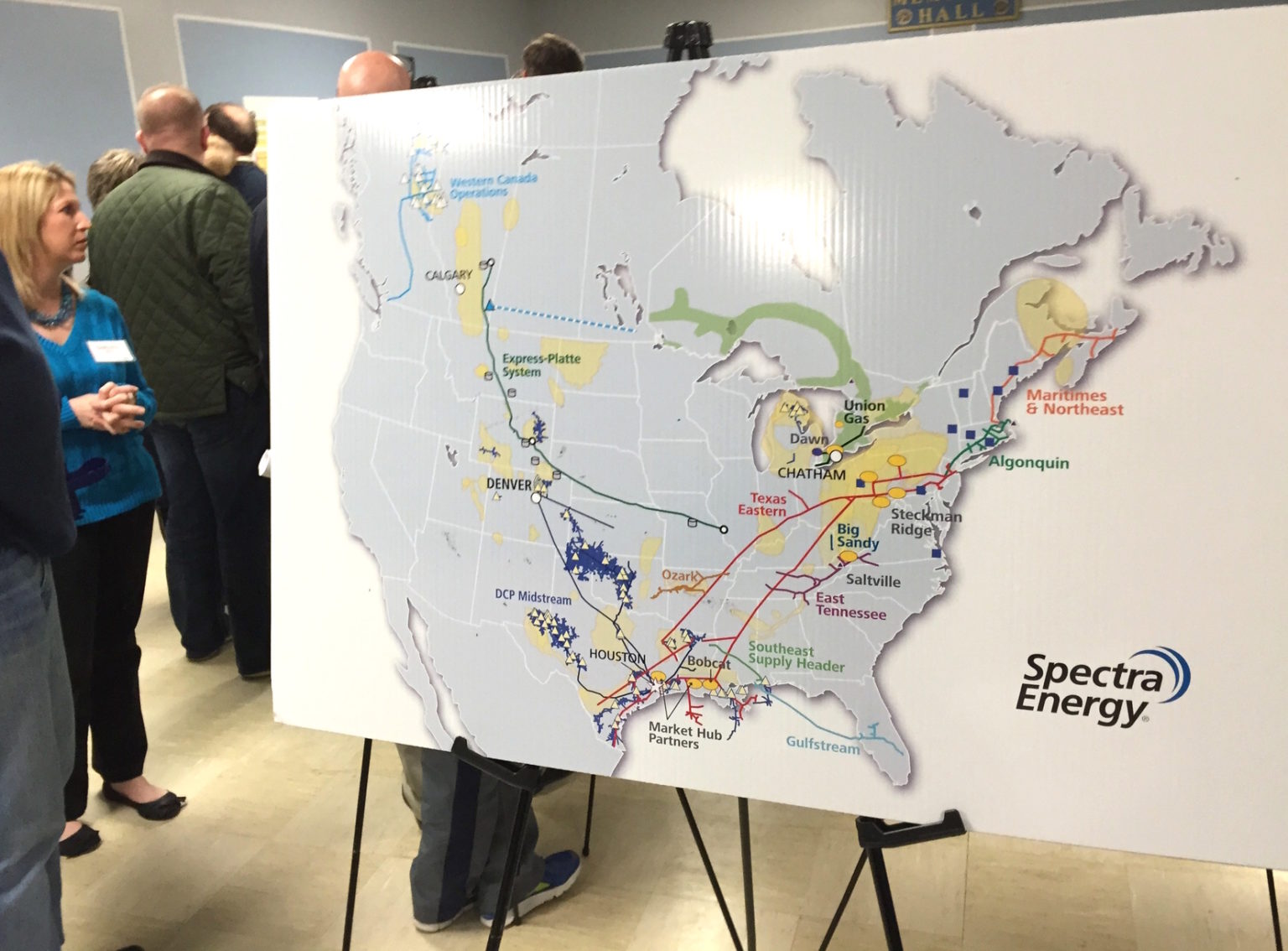A document submitted to the Federal Energy Regulatory Commission (FERC) suggests the agency had clear information that a contractor hired to review Spectra Energy’s proposed Atlantic Bridge gas project did not fully disclose its work for Spectra on a related project. FERC recently approved Atlantic Bridge, which would expand the existing Algonquin gas pipeline through northeastern states. The documents were obtained by DeSmog through an open records request.
As reported extensively by DeSmog, Natural Resource Group (NRG) — a wholly-owned subsidiary of international environmental consulting firm ERM — was hired in early 2015 by FERC as third party contractor to review the then-proposed Atlantic Bridge project. Such contractors, who are considered by FERC as independent consultants working on the government’s behalf, must disclose any potential conflict of interest.
Contradictory Disclosures of Pipeline Public Relations Work
NRG disclosed it was working at the time for Spectra on several unrelated projects. Yet crucially, it did not include the public relations services it had been providing since mid 2014 for the proposed PennEast pipeline, a partnership which includes Spectra. If approved, PennEast will connect to Spectra’s Algonquin pipeline, which the Atlantic Bridge project will upgrade. This link suggests NRG had an interest in the approval of Atlantic Bridge.
Based on the positive environmental assessment conducted in large part by NRG employees, FERC went on to approve Atlantic Bridge earlier this year. This approval came despite Massachusetts Senators Elizabeth Warren and Ed Markey pursuing an ongoing inquiry into the project’s potential conflicts of interest.
Yet a later document, which NRG filed with the commission and DeSmog has reviewed, shows that when FERC approved the project, it already had clear evidence NRG did not disclose its work for PennEast when first hired as Atlantic Bridge’s third party contractor. In the document, a supplemental disclosure submitted to FERC in August 2016, NRG now listed its work on PennEast. As the disclosure claims, “this project is not related to the Atlantic Bridge Project.”
From an August 2016 supplemental disclosure to FERC by NRG, which now includes NRG’s work for the PennEast pipeline. Despite the redactions, the information fits the work NRG is performing for PennEast.
This means that FERC had on file two contradictory disclosures pertaining to work NRG conducted for Spectra in 2015: one where it does not disclose its work on PennEast, and another where it does.
Still, the commission went on to approve Atlantic Bridge five months later.
FERC, Spectra Contend No Conflict of Interest
In its January 2017 authorization of the project, FERC commissioners Norman Bay, Cheryl LaFleur, and Colette Honorable responded to the conflicts of interest charges. They cited both the original disclosure and the supplemental one, stating that FERC staff reviewed these documents and found no conflict.
Yet it is unclear how the commissioners concluded there is no conflict when — as the documents reveal — the full extent of NRG’s work for Spectra was not disclosed at the time FERC hired the contractor. They also say nothing of the fact that NRG did not originally disclose its work on PennEast, yet did report that work more than a year and a half later.
The commissioners also refuted the conflict of interest charge by stating that since the work NRG provided for Spectra was less than one percent of the firm’s total revenue in the previous three years, NRG was not in conflict as third party contractor in Atlantic Bridge. Yet if the full extent of NRG’s work for Spectra was not originally disclosed, it remains unclear how FERC can be sure Spectra indeed fell below that threshold.
Spectra recently replied to FERC on the conflicts of interest allegations following rehearing requests on Atlantic Bridge’s certification by the project’s opponents. In its answer to FERC, Spectra denied the case amounts to a conflict of interest under the National Environmental Policy Act.
In doing so, the company sought to minimize its involvement in PennEast, stating it is a “small (10%) minority owner” in the project and “as such, Spectra Energy is not responsible for managing the PennEast project, which would include coordination with NRG regarding public affairs work for the PennEast project.”
Interestingly, Spectra further argued that even if a conflict were present, it would still not undermine the environmental assessment for Atlantic Bridge. According to Spectra, there’s no evidence that NRG‘s work on PennEast affected its “objectivity and integrity” in the project’s review process, as FERC staff “directly supervised and controlled NRG as third party contractor.”
Neither FERC nor Spectra Energy has responded to DeSmog’s requests for comment.
Ethics Experts Alarmed by FERC’s Actions
DeSmog spoke with experts in the field of regulatory law and ethics who were alarmed by this case.
Daniel Guttman, a fellow at Johns Hopkins University and professor at New York University Shanghai, has been studying the use of third party contractors in government for nearly four decades.
“My research has found that in practice, the conflict review process is generally broken in two core respects,” Guttman told DeSmog.
“First, too often contractors do not adequately disclose — and where they do, they are too often hired without regard for conflicts. Second, and this is the deeper problem, there has been little or no systematic audit — by the U.S. Government Accountability Office or Inspectors General, for example — of the conflict disclosure and review process.”
“In the case of the Atlantic Bridge project,” Guttman said, “if there was not full disclosure of relevant existing relations prior to the contract award, FERC should explain how it could have awarded the contract.”
Robert Verchick, an environmental law expert at Loyola University at New Orleans, agreed that this case raises serious red flags. “There definitely seems to be a problem here,” Verchick said. “If there’s even an appearance of a conflict, as this case shows, people’s trust in the government erodes and they cannot feel safe with new major infrastructure projects in their vicinity.”
“It seems to me,” added Verchick, who also served in Obama’s Environmental Protection Agency, “that this case could have been solved fairly easily with proper disclosures and an independent verification by FERC of the information provided by the contractor. There needs to be deeper examination of this entire issue.”
Sit-in at Massachusetts Governor’s Office
Despite FERC’s approval of Atlantic Bridge, opponents of the project are keeping up their fight, as they pin their hopes on several outstanding certificates on the state level. One activist, Andrea Honore from Weymouth, Massachusetts, where one of Atlantic Bridge’s compressor stations will be built, has been sitting in daily at the entrance to the office of Governor Charlie Baker since early March.
Honore is hoping to sway Gov. Baker to intervene against the project, which he has staunchly supported since taking office in 2015.
“The governor’s lack of action on behalf of his constituents, combined with a consistent and glaring lack of communication was humiliating and insulting,” said Honore.
Honore, as documented on her blog, has yet to receive a meeting with the governor. As DeSmog previously reported, Baker has close ties to Spectra’s lobbying and legal firm in Massachusetts, Mintz Levin.
Those who are attempting to stop Atlantic Bridge, like Honore, are facing an increasingly formidable opponent. In February, Canadian energy giant Enbridge purchased Spectra, making it the largest oil and gas pipeline and infrastructure company in North America.
Main image: A 2015 open house about Spectra Energy’s Atlantic Bridge natural gas project. Credit: Nancy Vann, Safe Energy Rights Group, used with permission
Subscribe to our newsletter
Stay up to date with DeSmog news and alerts








